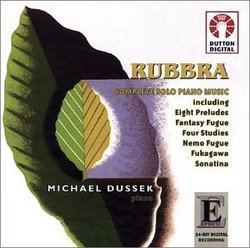| All Artists: Edmund Rubbra, Michael Dussek Title: Rubbra: Complete Solo Piano Music Members Wishing: 0 Total Copies: 0 Label: Dutton Labs UK Release Date: 8/14/2001 Album Type: Import Genre: Classical Styles: Opera & Classical Vocal, Chamber Music, Historical Periods, Classical (c.1770-1830) Number of Discs: 1 SwapaCD Credits: 1 UPC: 765387711221 |
Search - Edmund Rubbra, Michael Dussek :: Rubbra: Complete Solo Piano Music
CD Details |
CD ReviewsListen to Michael Dussek and his little daughter, Rachael Rodney Gavin Bullock | Winchester, Hampshire Angleterre | 10/23/2001 (4 out of 5 stars) "The distinguished English composer, Edmund Rubbra (1901-1986), is best known for his eleven symphonies and fine choral and chamber works. This CD contains all his music for solo piano. It is odd he wrote so little, considering his ability as a pianist.
I love Rubbra's music but I have to say that the piano music has not been my preference. It may be that his mature style was not really suitable for the instrument. That said, much of the material on this CD has not been available before and there are some fine compositions here. The Sonatina, Nemo fugue, Fantasy fugue and the two groups of teaching pieces are ones I shall return to.The programme begins with the Bachian Prelude and fugue on a theme of Cyril Scott. Scott was Rubbra's first composition teacher whose own style of composition was impressionistic and not at all Bachian, so was this a bit of a joke on Rubbra's part? The Sonatina is an early piece and not characteristic of Rubbra's mature style but nevertheless it has great charm and beauty. The central andante, in particular, has a Gallic grace and lightness of touch. A real delight. Fukagawa is an arrangement of a Japanese folk song. Rubbra gives no tempi or dynamics so those are up to the pianist.The Introduction, aria and fugue is a late work. The invention is rather heavy and the thematic material is not really memorable. The Eight preludes (1966) is the longest work he composed for piano solo. There are good things here but I find it uneven. The allegretto (3) and the following andante have considerable atmosphere. The final lento is full of foreboding but comes to a premature end. On the negative side, the writing is often thick and lacks the delicacy of the earlier Sonatina. In the moderato (2) the repeated notes in the left hand make the piano sound like the old honky-tonks that used to accompany silent films. As a whole, it does not quite come off.The Nemo fugue is a rather fine short work. The Four Studies are teaching pieces but also have a freshness of invention within their tiny spans. The Fantasy fugue (1982) is a fine piece, with a nobility of expression that builds to a climax and subsides to a beautiful ending. Bell sounds had haunted Rubbra since his childhood and you hear these throughout much of this work.Finally, the Nine teaching pieces have a special place in my life as I `played' some of them when I was learning the piano. It is nice to hear how they really go. Michael Dussek's daughter, Rachael, plays the first piece which she does faultlessly. These are beautiful miniatures and it is rare to see a composer extending his invention to write something really memorable for children - they make a change from Czerny. Rubbra took the theme from The Shining River and used it for the variations in his only brass band composition. This part of the recording is called an appendix but to me it is one of the best bits.The playing of Michael Dussek (and Rachael!) is exemplary, as is the recording. The full notes are by Michael Dussek and reveal his commitment to this composer. Did you know the Rubbra's had a pet donkey called Freddy?" |

